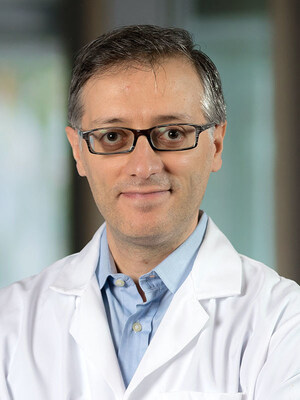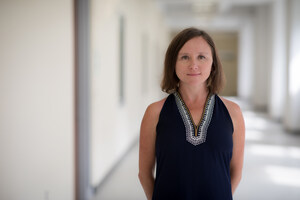BRONX, N.Y., Sept. 10, 2012 /PRNewswire-USNewswire/ -- Social media is increasingly popular but engaging in its proper use can prove confusing and challenging – especially in the medical and healthcare arenas. Albert Einstein College of Medicine of Yeshiva University has been awarded a two-year grant to educate faculty members and medical students on using social media appropriately and effectively. Einstein is one of four medical schools in the United States to be selected for the 2012 Education and Training to Professionalism Initiative by the Institute on Medicine as a Profession (IMAP) and the Josiah Macy Jr. Foundation.
(Logo: http://photos.prnewswire.com/prnh/20120531/DC16559LOGO)
According to the Pew Research Center's Internet & American Life Project, 66 percent of online adults use social networking sites. Yet a survey of U.S. medical schools deans found that 60 percent of schools reported incidents of unprofessional content posted on the Internet by their students.
"The next generation of doctors needs to understand how social media can be a double-edged sword," said principal investigator Elizabeth Kitsis, M.D., M.B.E., who is director of bioethics education and assistant professor of epidemiology & population health and of medicine at Einstein. "On the one hand, it can be a great way to provide personalized medical education for patients. However, great attention must be paid to maintaining the principles of professionalism, such as privacy and confidentiality of the physician-patient relationship." Accordingly, the title of the grant is "Social Media and Medical Professionalism: Perfect Match or Perfect Storm?"
"Since the current generation of medical educators may not share the same familiarity with social media as our students, our program first focuses on bridging that gap with a comprehensive faculty development program on social networking," explained Martha Grayson, M.D., co-investigator and Einstein's senior associate dean for medical education. "But our overarching goal is to teach medical students how they can use social media in a way that will benefit patient care while maintaining professional standards."
As part of the core student curriculum, first-year medical students will analyze their social media footprints, noting on-line postings that could be perceived as unprofessional, such as improper photos or the use of inappropriate language. Second-year medical students will repeat the process, highlighting changes in their social media presence. As part of a clinical skills course on patient interaction and taking patient histories, first- and second-year students will learn how to respond to possible social networking situations, such as a patient asking to become "Facebook friends."
Third- and fourth-year medical students will interview Bronx community members in order to assess how the local patient population uses social networks and how online communication might help improve patient health.
"Ultimately, the research into how our patients use these tools will help us develop a social media curriculum that can be integrated into Einstein's medical education program," said Dr. Grayson.
About Albert Einstein College of Medicine of Yeshiva University
Albert Einstein College of Medicine (http://www.einstein.yu.edu/home/default.asp) of Yeshiva University is one of the nation's premier centers for research, medical education and clinical investigation. During the 2011-2012 academic year, Einstein is home to 724 M.D. (http://www.einstein.yu.edu/education/md-program/md-program.aspx?id=11144) students, 248 Ph.D. (http://www.einstein.yu.edu/phd/index.asp?home) students, 117 students in the combined M.D./Ph.D. program (http://mstp.einstein.yu.edu/), and 368 postdoctoral research fellows (http://www.einstein.yu.edu/research/belfer-institute/default.aspx?id=28561&ekmensel=15074e5e_4074_4116_btnlink). The College of Medicine has 2,522 full time faculty members located on the main campus and at its clinical affiliates (http://www.einstein.yu.edu/home/affiliates.asp). In 2011, Einstein received nearly $170 million in awards from the NIH. This includes the funding of major research centers (http://www.einstein.yu.edu/home/nih.asp) at Einstein in diabetes, cancer, liver disease, and AIDS. Other areas where the College of Medicine is concentrating its efforts include developmental brain research, neuroscience, cardiac disease, and initiatives to reduce and eliminate ethnic and racial health disparities. Its partnership with Montefiore Medical Center (http://www.montefiore.org/), the University Hospital and academic medical center for Einstein, advances clinical and translational research to accelerate the pace at which new discoveries become the treatments and therapies that benefit patients. Through its extensive affiliation network involving Montefiore, Jacobi Medical Center (http://www.nyc.gov/html/hhc/jacobi/html/home/home.shtml) – Einstein's founding hospital, and five other hospital systems in the Bronx, Manhattan, Long Island and Brooklyn, Einstein runs one of the largest post-graduate medical training programs in the United States, offering approximately 155 residency programs to more than 2,200 physicians in training. For more information, please visit www.einstein.yu.edu (http://www.einstein.yu.edu/home/default.asp) and follow us on Twitter @EinsteinMed (http://twitter.com/EinsteinMed).
SOURCE Albert Einstein College of Medicine
WANT YOUR COMPANY'S NEWS FEATURED ON PRNEWSWIRE.COM?
Newsrooms &
Influencers
Digital Media
Outlets
Journalists
Opted In






Share this article